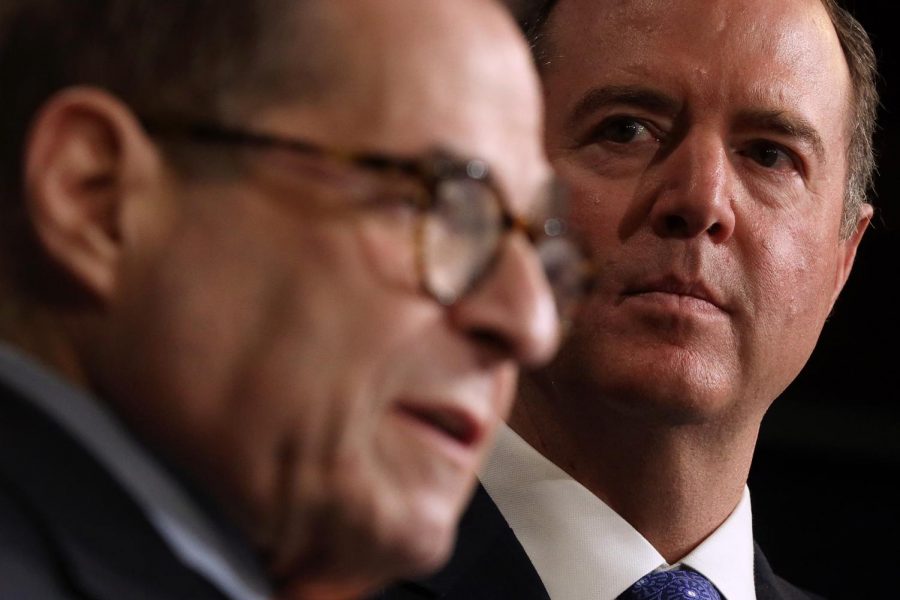For the third time in history, the U.S. president is undergoing a Senate impeachment trial. The trial, a manifestation of the intense partisan divide across the country, began earlier this month and is expected to continue until at least Friday.
The Start
On Dec. 18, the U.S. House of Representatives voted to approve two articles of impeachment against President Trump, while he hosted a rally in Michigan.
On Jan. 16, the articles were presented to the Senate. “Senators took an oath of impartiality” although, there is no real requirement for them to abide by that standard, according to an analysis by the Washington Post.
On Jan. 21, senators reconvened to establish the rules of the trial. The House managers—House Democrats who are essentially prosecutors in the trial—and Trump’s legal team were each granted 24 hours to present their opening arguments. Both parties were to spread those hours across three days. Notably, a vote on whether to have witnesses testify was delayed until further into the trial.
What Democrats Argued
Over the course of three days, starting Jan. 22, Democrats argued the legitimacy of the impeachment articles: abuse of power and obstruction of Congress.
The managers, led by California Rep. Adam Schiff, claimed that Trump abused his power when he asked Ukraine’s president to investigate former Vice President Joe Biden and his son Hunter, while suspending nearly $400 million in military aid to counter Russian-backed separatists.
“They don’t really have a concrete statute. What they have is abuse of power,” said Taylor Dark III, a Cal State LA political science professor. “Which I think is a legitimate basis because there’s things a president can do-various things they can do that constitute an abuse of power but which are not technically violations of some law.”
Though, the circumstances surrounding Trump’s actions with Ukraine are “ambiguous.” It was reasonable to be suspicious of Hunter Biden’s business in a Ukrainian energy company, while Joe Biden was vice president. However, said Dark, Trump could have ordered an investigation by more conventional means through his attorney general and the intelligence community. “That would be a more legitimate way of doing it than the way the president did.”
“To me it’s kind of a borderline case,” he said chuckling. He added, “It is sufficiently enough in a grey zone that a lot of people could see it going either way. And if you’re not sure, then well, why not just go with your party?”
In a more staunch stance, history scholar Eli Merritt had argued Alexander Hamilton would lead the removal of Trump, in an op-ed for the L.A. Times.
Using history as precedent, Merritt referred to the electoral college tie between Thomas Jefferson and Aaron Burr in 1800. Hamilton spearheaded a campaign for the House to resolve the tie and win Jefferson the Oval Office, as he feared Burr, “would undertake ‘a bargain and sale with some foreign power… by means of the public monies’” for his personal gain, Merritt wrote, drawing a parallel to Trump.
In their bolster of the second article, Democrats alleged Trump obstructed Congress by not turning over requested documents and asking White House officials not to testify during the House investigation.
What the White House Argued (So Far)
On Jan. 25, Trump’s lawyers commenced their legal arguments—albeit only using up two hours of their allotted time. The defense labeled their remarks that day as a “sneak preview” of the remainder of their arguments which would continue the following Monday.
Part of the president’s legal defense was the rough transcript of his July call with the Ukrainian president. In a reflection of the partisan gap in the country, Democrats have referred to it as evidence of Trump’s misconduct, while Republicans argue it vindicates him.
Thomas Minter, an East LA College student planning to transfer to Cal State LA, does not buy the managers’ logic. “I have read the transcript. I do not see it. I do not see where they’re getting this.”
He juxtaposed Trump’s actions with Biden withholding $1 billion in aid as leverage to fire a Ukrainian prosecutor deemed corrupt by western governments. Minter referenced a video of Biden bragging about it at a 2018 Council on Foreign Relations panel.
While Trump was legitimately trying to root out corruption in his call, Democrats tried to frame his efforts as an abuse of power while ignoring Biden’s actions which he admitted on camera, said Minter. There’s “a clear double standard being imposed,” he argued.
Witnesses. Maybe?
In order to approve having witnesses testify, the Senate must have a simple majority of 51 votes to support such a decision. That means four Republicans must side with Democrats when that time comes.
While there’s a strong partisan split among Americans over whether the president should be removed from office, a 66% majority support having witnesses summoned in the trial, according to an ABC News/Washington Post poll conducted on Jan. 20-23.
On Sunday, pressure by Democrats to call new witnesses were renewed when manuscripts of an upcoming unpublished book by John Bolton were reported on by the New York Times. In it, Bolton—the president’s former national security advisor—alleged Trump directly tied Ukraine aide to a probe into the Bidens.
In a follow up email, Dark expressed skepticism about a significant change in the direction of the trial, despite the development. Even with Bolton as a witness, Republicans would still justify the president’s actions, he said.
“Ultimately, the GOP will argue that investigating the Bidens was legitimate (albeit mishandled), and that delaying the aid was an appropriate use of presidential power (although perhaps not wise in this instance),” Dark stated. “I suspect that most GOP Senators do recognize that this was a questionable maneuver by Trump, and probably an abuse of power, but do not view it as such a grave offense that it merits removal from office.”
The odds of four Republicans siding with Democrats to call witnesses are still slim; plus, “the Democrats need 20 GOP defectors to convict, so the Republicans can lose a few, even four, and still be sitting pretty,” Dark added.
Meanwhile, in Iowa…
On Feb. 3, the Hawkeye state will host the start of the primary voting season. Democratic senators running for the party’s nomination, face a setback as they remain in Washington for the trial, as opposed to campaigning in the inaugural state.
However, even in their physical absence, candidates can still get exposure on social media; their respective campaigns will also continue their efforts on their behalf, Dark pointed out.
Was it Worth it for Democrats?
This drama takes place in an election year where Trump will be the first impeached U.S. president to run for reelection, if he survives the trial as he’s expected to.
Dark said impeachment may not have significantly moved the needle in voter sentiment, to add onto that, interest in the impeachment scandal has waned drastically. “Web traffic and TV ratings tell a similar story,” the Associated Press reported, “with public interest seeming to flag after the House voted last month to impeach [the] president…”
In perhaps the most severe consequence, voters like Minter, who are observing the trial, have been angered. Democrats made an illegitimate and unlawful attempt to remove the president, he said.
“We have due process for a reason, we have, you know individual rights, we have separation of powers. All of this was laid out, and this is essentially, I think a huge violation of all that. My personal opinion, I think a lot of these people,” who are trying to remove Trump from office, “need to get tried for treason.”
A recent Washington Post-ABC poll revealed Trump is “more competitive” against his Democratic rivals for the presidency compared to his standing in the previous fall. Forty-nine percent of those polled expect Trump to win the election compared to 43 percent that say a Democratic rival will defeat him. In other words, at least according to the data, Trump’s more favored to win reelection since being impeached.











